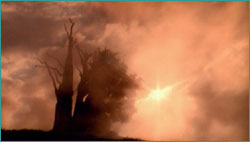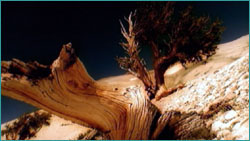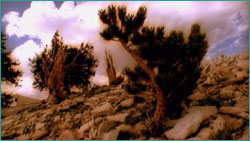|
 |
 |
|
|  Old as the hills, a bristlecone pine stands
majestic on an exposed flank of California's White Mountains. Note: To
protect its identity, neither this nor any other bristlecone shown in this
article is the Methuselah Tree.
Old as the hills, a bristlecone pine stands
majestic on an exposed flank of California's White Mountains. Note: To
protect its identity, neither this nor any other bristlecone shown in this
article is the Methuselah Tree.
|
A Tree's Secret to Living Long
by Peter Tyson
It's hard enough to accept that a tree that was a seedling before the Egyptian
Pyramids went up is still alive today, as is the case with the Methuselah Tree,
a bristlecone pine more than 46 centuries old. But it's truly baffling to learn
under what conditions it has accomplished this extraordinary feat.
Just ask Robert Mohlenbrock. A decade or so ago, Mohlenbrock, a professor of
botany at Southern Illinois University at Carbondale, visited the Ancient
Bristlecone Pine Forest, part of California's Inyo National Forest. "At the
time I thought that any organism that lived longer than the norm had to have
optimal conditions going for it," he wrote in Natural History (5/85).
For plants, that would mean moderate temperature, shelter from extreme weather,
and plenty of moisture and nutrients.
Mohlenbrock was in for a surprise.
"When I stood looking at Methuselah," he wrote, "I knew I had been wrong."
Though it was then midsummer, a bone-numbing wind tore right through him,
Mohlenbrock recalled, and the scarce patches of soil at the roughly 10,000-foot
elevation where Methuselah and other venerable bristlecones grow, appeared to
contain little if any moisture. (A glance at the panoramas in Explore the
Methuselah Grove will give you the idea.)
 How can bristlecones make it in such an unforgiving environment? Read
on.
How can bristlecones make it in such an unforgiving environment? Read
on.
|
|
So what's Methuselah's secret? How can it and its kind survive, much less
thrive, in conditions that would strike fear into the phloem of virtually all
other plants? After decades of intense study, inaugurated in the 1950s by the
legendary dendrochronologist Edmund Schulman, scientists are starting to get a
grip on what makes bristlecone pines so Methuselah-like. (Or should we say
"bristlecone-like?" After all, the biblical Methuselah, ancestor to Noah, was
said to have lived 969 years, while the Methuselah Tree, thought to be the
world's oldest living thing, has endured almost five times as long.)
It turns out that the bristlecone pine has evolved survival strategies that
might make other, less hardy plants, well, green with envy. These strategies
help it cope with one of the most flora-unfriendly environments on the planet.
Mountains of adversity
Bristlecone pines come in two varieties. Pinus aristata, the Rocky
Mountain bristlecone pine, lives in Colorado, Arizona, and New Mexico, while
P. longaeva, the intermountain bristlecone pine, occurs farther west in
California, Nevada, and Utah. In California's White Mountains, the most ancient
members of P. longaeva, including the Methuselah Tree, can be found high
in the subalpine zone, from 9,500 feet to timberline at roughly 11,500
feet.
|  Though appearing to be little more than
a sapling, this bristlecone may be well over 100 years old.
Though appearing to be little more than
a sapling, this bristlecone may be well over 100 years old.
|
Here, in the rain shadow of the mighty Sierra Nevadas, which block weather
approaching from the west, the average annual precipitation is less than 12
inches, and most of that falls as snow in winter. In summer, which can provide
as few as six weeks of warmth for bristlecone pines to generate growth and
reserves for overwintering, precipitable moisture ranks among the lowest
recorded anywhere on Earth. Moreover, the soil the bristlecones cling to is not
dirt as most plants know it but dolomite, a limestone substrate with few
nutrients. With so little time to get energy from the sun, and so little energy
to be had from the soil, growth is grindingly slow. A bristlecone pine may add
to its girth no more than an inch per century.
So how does the bristlecone make it in a place so hostile to life that the only
other tree that can survive there is the bristlecone-like limber pine? A place
that in certain areas hosts but a few forlorn clumps of that symbol of
Western fortitude, the sagebrush, and in others looks like the rocky, lifeless
surface of Mars?
Continue: A tree's tricks
Photo credits
Explore the Methuselah Grove |
A Tree's Secret to Living Long
Build a Tree-Ring Timeline |
Illuminating Photosynthesis
Resources |
Teacher's Guide |
Transcript |
Site Map |
Methuselah Tree Home
Search |
Site Map |
Previously Featured |
Schedule |
Feedback |
Teachers |
Shop
Join Us/E-Mail |
About NOVA |
Editor's Picks |
Watch NOVAs online |
To print
PBS Online |
NOVA Online |
WGBH
© | Updated November 2001
|
|
|
|